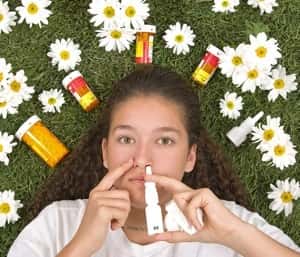
People who are sniffling, sneezing and suffering because of summer allergies are caught in a terrible bind. Some popular antihistamines have the ability to affect the brain in an unpleasant way. In addition to causing drowsiness they may actually do damage when taken for long periods of time. One reader shared this concern:
Q. I recently heard that anticholinergic drugs can cause brain atrophy and may increase the risk for dementia.
What are the alternatives to anticholinergic drugs for the treatment of allergies? I am concerned since I have been using Benadryl and Claritin regularly for five years.
A. A new study shows that people who take anticholinergic (AC) drugs (including the antihistamines you’ve used) may experience changes in brain structure and function (JAMA Neurology, online April 18, 2016).
The researchers found “increased brain atrophy [shrinkage] and dysfunction and clinical decline” associated with the use of AC medications. We worry about this, particularly for older people who may be vulnerable to dementia.
There are a great many prescription and over-the-counter medications that contain ingredients with anticholinergic activity. Sadly, the labels of such medications rarely mention anything about this effect.
What Are Some Danger Signals with Allergy Remedies?
There are several classic symptoms that may tip you off that a medication might have anticholinergic activity. They include:
- Dry mouth, dry nose, dry eyes, dry skin, reduced sweating
- Constipation
- Drowsiness, dizziness, unsteadiness
- Headache, confusion, memory problems, disorientation
- Blurred vision, visual disturbances
- Urination challenges, difficulty emptying bladder
We have searched the medical literature to find anticholinergic drugs. Some are allergy remedies (antihistamines), while others are for treating overactive bladder or high blood pressure. Antidepressant medications can have AC activity as can drugs for diarrhea.
To our surprise, there was no easy-to-find list. Keep in mind that some medications have strong AC activity while others have relatively weak anticholinergic action. The real trouble occurs when someone is taking three of four different medicines that have some degree of AC activity. The end result can be a substantial anticholinergic “burden” as doctors have labeled this. Here is the list that we have compiled. We have no doubt it will keep growing as more medications are added.
Allergy Remedies with Low or No AC Activity:
An alternative antihistamine, fexofenadine (Allegra), is much less likely to have AC activity than Benadryl (European Journal of Pharmacology, Jan. 4, 2005). You may also want to consider a steroid nose spray such as budesonide (Rhinocort), fluticasone (Flonase) or triamcinolone (Nasacort). These products are now available over the counter but we would caution you not to use a corticosteroid nasal spray for long periods of time. Such products can cause nasal irritation, stinging or bleeding. Prolonged use may lead to systemic absorption and steroid complications such as glaucoma or cataracts.
What About Natural Allergy Remedies?
The best solution to allergy misery is to try to avoid the offending allergen. That means avoiding cats if they make your eyes itch or your nose run. Other things that can cause trouble include cleaning agents left on floors. When they dry the chemicals can circulate on dust particles and be inhaled and cause mischief. There are too many potential problems to list them all, but dust mites and pollen are big contributors to congestion and they are hard to avoid.
Vitamin C:
Most doctors pooh-pooh ascorbic acid and we have to admit that research has been surprisingly squishy with this vitamin. That said, there have been some studies suggesting that vitamin C may help reduce allergic symptoms and modulate the immune system. There is even some suggestion that vitamin C has a kind of antihistamine activity. (You can find references to this research in our allergy chapter in Best Choices from The People’s Pharmacy).
Stinging Nettle (Urtica Dioica):
This plant sounds uninviting and indeed if you run into it in the woods you would regret the interaction. Tiny hairs on the plant can cause a nasty rash and an itch that lasts for a very long time.
When it is swallowed in pill form there is some reason to believe nettle can help calm allergic symptoms. One study demonstrated that an Urtica dioica extract blocks the inflammatory pathways that produce allergic symptoms (Phytotherapy Research, July, 2008).
Should you wish to learn more about other ways to control allergic symptoms without experiencing anticholinergic complications, we have a whole chapter on allergy in our book, Best Choices from The People’s Pharmacy. You will also learn about butterbur (Petasities hydrides), NasalCrom (cromylyn sodium) and more details about corticosteroid nasal sprays.
And please don’t forget to check this link with a list of other anticholinergic drugs. Of course sometimes it is impossible to avoid all AC drugs and you will need to share the list of drugs with your physician before stopping any medication.

